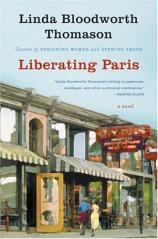Reading Group Guide
Discussion Questions
Liberating Paris

1. Consider the maxim --- "a new incarnation of whatever has once been is sometimes more pitiful than nothing at all." In what manner does Wood's renewed relationship with Duff succinctly prove this true? Would you describe Wood's declining interest in his wife, and his renewed interest in a "soul-mate," a mid-life crisis, despite his protestations to the contrary?
2. How does Milan spin the trash-turned-socialite stereotype on its head? What are her deepest fears? Is Duff's free-spirited form of femininity ultimately weaker and more calculating than Milan's? Do you think either Milan or Duff represent true feminism? Do both?
3. In the context of slavery, and the schism between North and South, how is it significant that "New Yorkers love southerners who write about their mammies. Hell, they would even throw a party for you"? What uncomfortable social undercurrents does this address?
4. Why did Jeter originally have misgivings about allowing Mavis to be artificially inseminated with his sperm? Do you think those qualms were justified? Does the novel present an argument for the creation of life in any way possible?
5. Consider Slim McIlmore's audacity in taking the boys to the municipal pool on "Colored Day," and Mavis Pinkerton's stand against Lonnie Rhinehart's taunts and jeers. How does the novel depict the small acts of great courage that can change societies for the better? How do Sidney Garfinkle's walks with Slim coax her to regain an interest in life? Discuss the manner in which values are presented in Liberating Paris --- are people who praise ‘traditional values' really holding on to biases?
6. Why do you think Wood assumed that Milan became pregnant on purpose? How does this assumption speak to his class-consciousness? Why do you think the author waited to reveal the truth?
7. How does the novel portray the decline in values such as respecting the elderly and appreciating craftsmanship?
8. Do you agree with the depiction of large, big-box chain stores in Liberating Paris? How is the Fed-Mart an anathema to everything Main Street stands for? What do you think the novel's last line --- "there is nowhere left to put the town but inside children like these" --- means?
9. What does the phrase "liberating Paris" usually refer to? Is the title used ironically since the novel is about the emancipation of the individual? At the end of the novel, how are the main characters transformed? Of all the couples that are formed, whom do you find most touching? Why?
10. As the plot involves a lesbian, several religious conservatives, a New York sophisticate and an elderly inter-racial couple, amongst other relationships seemingly outside of "proper society," how does Liberating Paris function as a social commentary for our times? In what way does the author reveal her own social vision?







